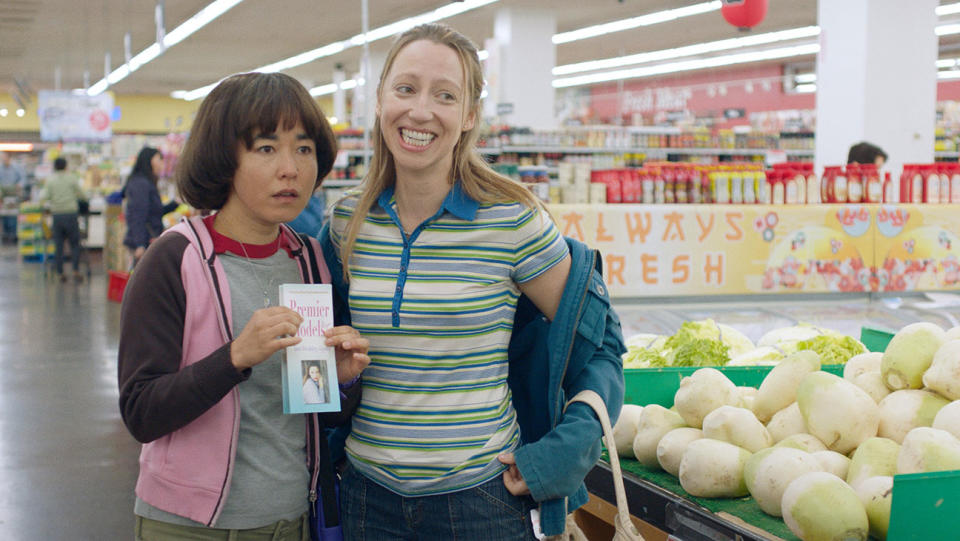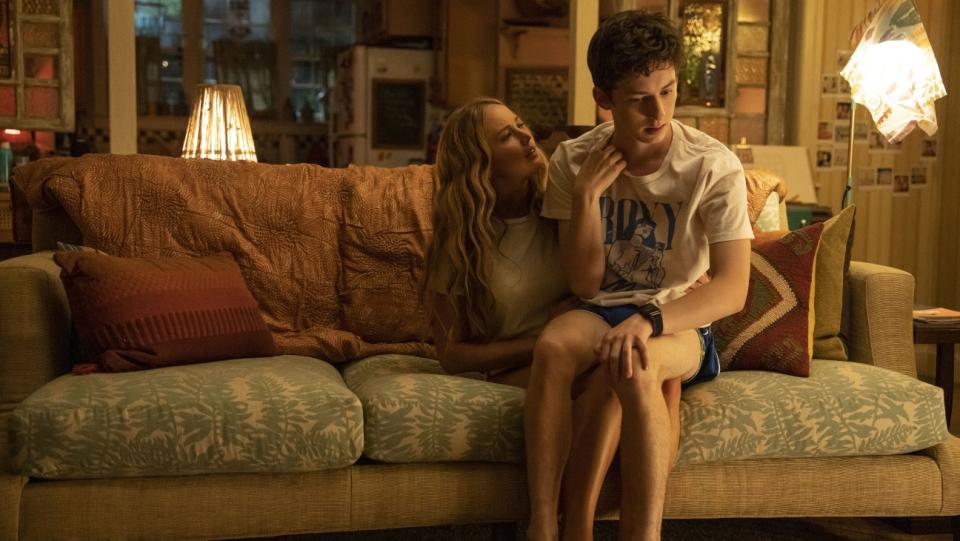Toronto: Odenkirk Provissiero Entertainment Founders on 15-Year Track Record of Breaking Comedy Talent
- Oops!Something went wrong.Please try again later.
- Oops!Something went wrong.Please try again later.

The Odenkirk Provissiero Entertainment offices are easy to miss, insomuch as you wouldn’t expect that the offices for the management-production outfit responsible for careers like Oscar nominee Stephanie Hsu’s and films like this summer’s R-rated hit No Hard Feelings, starring Jennifer Lawrence, to be housed in a circa 1920s Los Angeles craftsman — the kind that Zillow dreams are made of. It makes more sense when you realize that the offices are around the corner from the Upright Citizens Brigade, the city’s go-to improv theater.
Currently, in its 15th year of operation, OPE has established itself in the industry for breaking new comedy talent. Notably, the company has had at least one client on Saturday Night Live since its inception (at one point representing four of the cast’s onscreen players at once). Current clients include I Think You Should Leave’s Tim Robinson, Insecure’s Yvonne Orji, and Bottoms co-stars Rachel Sennott and Ayo Edebiri. And, yes, Better Call Saul actor Bob Odenkirk, who is the husband of co-founder Naomi Odenkirk, is also a client.
More from The Hollywood Reporter
'Backspot' Review: Devery Jacobs and Evan Rachel Wood in a Perceptive Queer Cheerleading Drama
TIFF Audience Ready to Go All In With Paul Dano in 'Dumb Money'
In the OPE offices, the living room is now a lobby, the dining room is refitted as a conference room, bedrooms are repurposed as offices, and the kitchen — well, that remains a kitchen. But the environment lends itself to the kind of collegial workplace that Odenkirk and Marc Provissiero hope to foster among their team that now occupies outposts in Los Angeles and New York, where a strict “no assholes” policy is enforced.
Ahead of the Toronto Film Festival, where clients like Jay Duplass are premiering new projects, Odenkirk and Provissiero sat with THR to talk about the past 15 years, frequenting “The Shithole,” and what is coming up next.
What brought you together 15 years ago?
NAOMI ODENKIRK We have a mutual friend in Greg Daniels, because Marc represented so many people who were part and parcel to the success of The Office, and I worked with one of the actors, Jenna Fischer. I was just a solo manager at the time, not looking to partner with anyone. I finally was at a place where I felt I was standing on my own two feet. I had Jenna Fischer on The Office, and Bill Hader and Kristen Wigg on SNL. I had rebuffed offers to join other management companies, but when Marc and I met over lunch I couldn’t think of a reason why not.
MARC PROVISSIERO At that point, I had been an agent for 10 years at William Morris in the TV lit department and everyone would always say to me, “You agent like a manager.” This was before a lot of agents became managers. It was tough to be an agent the way I was agenting, so I quit and started my own company, unceremoniously one day. I called up Greg Daniels, who I had basically introduced to most of his writing staff, and I said, from your purview, if I were to partner with someone, who would it be? And he said, there’s this woman who does with comedy talent, what you do with comedy writers. We met a few months later, and by the end of lunch we were partners.
What were the guiding principles at OPE when you were first starting out?
PROVISSIERO When someone got me so excited, I couldn’t imagine the thought of not pursuing that person and working with that person. [I asked], “Are we so excited about this voice, this script, this actor, that we see a vision where we can be incredibly instrumental?” We didn’t put a clock on [the company]. We didn’t have a business plan. I don’t think either of us knew how to make one, frankly. We didn’t look at numbers. If she had an actor who wanted to write, Naomi had a partner. If I had a writer who also wanted to act, I had a partner.
ODENKIRK I was always very interested in discoveries — not jumping on a train that’s already moving. I would rather find somebody where I recognize the potential. In the case of some of my earlier clients, never mind an agent, they didn’t have a headshot. It was really just the trust of my gut. On the lit side, Marc was very much that way, too. We would take trips to Chicago and sign people who were still performing there without having any auditions or representation. I would go out there and sign somebody whom I loved on the talent side like Tim Robinson, and Marc immediately got a script out of him and moved him in the direction of starting to sell his own shows.
Where were your favorite places to discover that new talent?
ODENKIRK I just wanted to approach people that nobody else was approaching, that I just believed in. An agent saying, “I have a client who needs a new manager,” was never as exciting to me. I was going to the The Groundlings — but the Sunday company that is still part of the school — every week. You can see the wave of new ways of thinking that performers are influenced by. As things progressed, the Sunday company [shows] at the Groundlings — everybody onstage was eventually already repped. In Chicago, we started doing the underground stuff. And then we started going to shows that really were only attended by other performers. One was like in the attic of someone’s house; it was called The Shithole.
Did you have a moment where you said to yourselves, “We’ve made it”?
PROVISSIERO When she was approximately 24 years old, Anna Konkle was a brand new client to us. She was an actor who had done a couple of short films with her friend Maya Erskine. She came in with pages of ideas, and one of those ideas was this picture of a middle-school yearbook photo page with a penis coming out of this guy’s head, and underneath it, it said, “He’s a bitch.” They just marked up this whole page with crayon, and they just said, “We’re gonna make this into a show. We don’t even know how or what it is.” It took us seven years to do it, but on the first day of filming [on Hulu’s Pen15], five minutes before the first shot for episode one of a full series order, I remember saying, “This is working.”

Like Pen15, how do you decide which projects you attach to as producers? What was behind No Hard Feelings?
ODENKIRK The genesis of the project is something wonderful that Marc started that we called “The IP Challenge” a few years back. He said, “IP is so important — let’s all be thinking in out-of-the-box ways where IP might exist.” Not just a book to option or an article, but IP in all of its forms, whatever it might be. It was my turn to present something, and I found an old Craigslist ad, and it was hilarious. “Sugar Baby for My Son” was the title of an ad on Craigslist from 2013. I printed it up on a piece of paper and brought it in and we all were talking about all the different ways the stories could go and which clients might be right for it. We packaged it all up and attached [director] Gene Stupnitsky, and he wrote a script with John Phillips, and we brought in another producer who was more full-time, then Jen Lawrence attached. We had all the elements and then took it out to market.

In the past couple of years, there was an increased wave of agents becoming managers. How was it watching that tide change, having been in the management-production space for well over a decade at that point?
PROVISSIERO Some of it is supported by the increased adoption of a dual manager and agent for a client. When I started off as an agent in lit, most writers didn’t have managers. And then there was this adoption of writers also finding value in good management. To some extent, there was room. In some cases, it seems like a lot in this particular marketplace. Back during the ATA conflict, a lot of agents became managers. But the truth is, we don’t think about it that much.
ODENKIRK I’m not sure I begrudge what might be an increased saturation wanting to sign the same people that we’re wanting to sign. Just because you had the idea first, it doesn’t mean that other people are not welcome to plant their flag or hang their shingle.
What do you look for when bringing in new reps?
PROVISSIERO There’s the nice thing about being what I’ll call a boutique is we get to sift through a lot. We do want to grow, but we only want to grow when we know that the person’s a good person to be around. And that they have a voice, themselves, as expressed by who they represent. It doesn’t feel like it’s a commerce grab versus they built a business that gets them excited. There are some very successful management operations where it’s one person and very successful operations where there are 40 managers. Then you see less than ideal representation from of all sizes. I really don’t think it matters how many people are there or not. We’re personal managers, by definition and by title, and we can either go about and find the resources necessary to support a client’s vision or you don’t.
ODENKIRK For me, a big question is, what is their taste in talent? What kind of business is it that they’re looking to build? And we have a firm, “no assholes” policy. Our culture means a lot to us.
This interview has been edited and condensed for clarity.
Best of The Hollywood Reporter
Meet the World Builders: Hollywood's Top Physical Production Executives of 2023
Men in Blazers, Hollywood’s Favorite Soccer Podcast, Aims for a Global Empire

